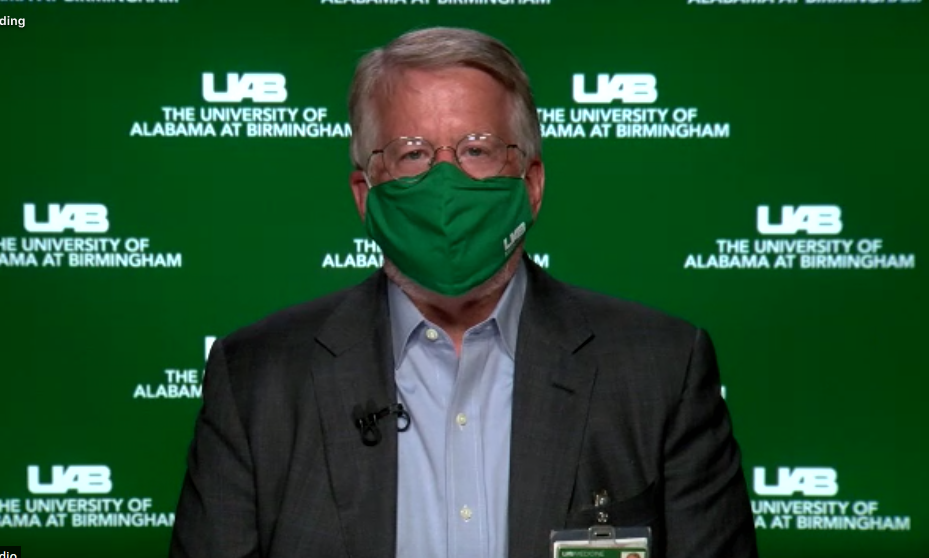Several Birmingham area hospital administrators and physicians pleaded with the public Friday to help slow the spread of COVID-19 as those hospitals and others across the state continue to see surges in coronavirus patients.
Those pleas came as the state on Friday set another record for new daily cases and COVID-19 hospitalizations. The state’s ICU bed availability this week was at a record low and the number of coronavirus patients on ventilators was at a record high.
“We’ve entered a critical stage, and the worst for Birmingham, central Alabama and our state I think is just beginning,” said Anthony Patterson, CEO of UAB Hospital, speaking to reporters during the Friday briefing.
Patterson said the number of COVID patients at UAB has risen almost 130 percent since Thanksgiving, and that COVID-19 patients now make up more than 20 percent of the hospital’s patient census. It will likely be spring before the state will see impacts of vaccines on the spread of the disease, he said, worrying hospital staff that more surges could come after the holidays.
Patterson asked the public to wear masks, social distance, wash their hands, and to “not gather indoors with groups of people who aren’t a part of your immediate family and living in your household.”
There was a record 2,447 people hospitalized with COVID-19 statewide in Alabama on Friday, a 68 percent increase since Thanksgiving. UAB Hospital had a record 175 COVID-19 patients on Thursday, which had dropped to 174 by Friday afternoon. Huntsville Hospital System had a record 460 coronavirus patients on Friday, a 74 percent increase since Thanksgiving.
{{CODE1}}
Dr. Jane Bryce, Chief Medical Officer at Shelby Baptist Medical Center, said during Friday’s briefing that hospitals are now seeing post-Thanksgiving surges of COVID-19 patients.
“We are seeing them reach the highest levels that we have experienced since the beginning of this pandemic,” Bryce said.
The numbers are concerning because UAB also cares for patients from rural hospitals that need emergency care not provided in smaller hospitals, Bryce said.
“So when our hospitals are at or near capacity it really impacts our ability to provide the care that we need for ourselves and some of our rural neighbors who depend on that care,” Bryce said.
Alabama added 5,348 cases Friday, but the Alabama Department of Public Health in a statement said 382 of them were backlogged results performed between Dec. 10 and Dec. 13. Still, it was the first day the state saw more than 5,000 cases in a day and the remaining 4,966 was yet another record high.
{{CODE2}}
“While many get COVID and might have mild symptoms, the 2,400 that are admitted to our hospitals right now are not experiencing mild symptoms,” said Chris Moore, CNO and COO for St. Vincent’s Hospital, also speaking to reporters at Friday’s briefing. “And sadly, 50 to 60 percent of our state ICU’s, use those beds are now taking care of critically ill COVID patients.”
Caring for so many critically ill patients, and dealing with the high numbers of deaths, over the last nine months has taken a toll on the state’s health care workers, Moore said.
“We have countless supportive programs in place for our associates but in reality, the adrenaline is gone,” Moore said. “Our staff, they’re tired. Our associates are fatigued.”
The greatest gift the public could give those exhausted health care workers is to take precautions seriously over the upcoming holidays, Moore said.
“What we’ve experienced since Thanksgiving, and that we continue to experience right now with our highest census of COVID patients since the pandemic began, cannot repeat itself,” Moore said.
Dr. Jeremy Rogers, an emergency medicine physician at Grandview Medical Center in Birmingham, told reporters that unless the public takes seriously their pleas to wear masks, practice social distancing and avoid gathering with those outside of their own households over the holidays “we’re gonna find ourselves in a very scary place in two weeks.”
“I think you can probably hear the collective holding of breath that we’re having about what’s going to happen over the next couple of weeks,” Rogers said.
{{CODE3}}
The Alabama Department of Public Health reported Friday that 45 more Alabamians died from COVID-19 and on Saturday reported another 93 deaths, bringing the state’s death toll to at least 4,389 since March.
While the department has reported a record 500 deaths over the last two weeks, many of those deaths happened earlier in the pandemic. The date on which date is reported does not necessarily reflect the day on which a person died and it takes several weeks for ADPH to confirm the date of death.
{{CODE4}}
At least 291 people have died in the month of December, according to ADPH’s data on deaths by date of death, though that data is incomplete for the last two weeks and the number of dead in December could rise dramatically in the coming days and weeks.



















































